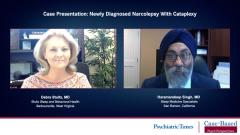
Narcolepsy Treatment Advice
In this custom video series, Debra Stultz, MD, and Haramandeep Singh, MD, share advice for community-based psychiatrists on the management of narcolepsy.
Episodes in this series

Haramandeep Singh, MD: What advice do you have for community-based psychiatrists treating patients with narcolepsy? What would you tell them? How should they interact with sleep specialists?
Debra Stultz, MD: They need to find 1 they’re comfortable with. They need to start thinking about sleep issues on any of their resistant psychiatric patients, whether it’s depression, anxiety, or schizophrenia. The studies on people who have schizophrenia and narcolepsy have shown that those patients often don’t respond well to antipsychotics. But if you diagnose the narcolepsy and you treat them with a little stimulant and an antipsychotic, they get better. When they’re seeing resistant anything, they should be thinking sleep disorders.
It’s important to not assume that it’s probably their medicines or that they’re way better than they used to be. How much better is better enough for these patients? If they come in and you think they’re schizophrenic and you’ve gotten them to this point and they’re doing better, is that as good as it gets if they’re sleepy every day or they sleep 12 or 13 hours a day? They may not be hallucinating, but they’re still sleeping a lot and napping every day. It could be the medicines, but could we get them better?
It’s the same thing with depression and treating depressed patients. You’re often treating their cataplexy whether you know it or not. They may not come and say, “I have sleepiness, I have cataplexy,” because they’ve been on antidepressants for a long time. The only symptom you may get in a depressed patient at a psychiatric office is the excessive daytime sleepiness. Educating all the providers, even the therapist, about this excessive daytime sleepiness or whatever they call it—I’m tired, I can’t wake up, I can’t get going in the morning—is important. This symptom needs to be a serious symptom that we address, and we look for sleep apnea, narcolepsy, and what medicines we’re using.
Haramandeep Singh, MD: One hundred percent yes. Exactly. Not everyone is going to be doing an Epworth Sleepiness Scale in their office—not a psychiatrist, not a neurologist. But if you can identify a patient, they’re not going to say, “I’m sleepy,” but they may say, “I’m tired, I’m fatigued, I’m unmotivated.” They have inertia. That’s your chance to step in and look for something else that might be going on. It doesn’t mean narcolepsy. You could have sleep apnea that’s impacting you to a degree. But the point is to make an intervention at that point with our resistant patients. You can really make a difference in their lives.
Debra Stultz, MD: Yes. Restless leg syndrome is a huge 1 in the psychiatric world. Not only do the patients have it, but a lot of our medicines increase it. When they take the medicine is so important. Psychiatrists at community-based facilities need to be looking at that, what medicines you’re giving them, and when you’re giving them. Are they taking any vitamins? Is there magnesium? There are a lot of behavioral treatments for every 1 of our sleep disorders.
Haramandeep Singh, MD: Absolutely. It’s important to work together with psychiatrists, neurologists, and primary care physicians in the community. As you said, this is why I love doing these programs. We’re educating and getting the word out there to keep an eye out for patients in your practice who likely have sleep disorders. We know that probably 1 of 2 people walking on the street has a sleep issue of some sort.
Debra Stultz, MD: That’s right.
Haramandeep Singh, MD: They’re prevalent, and in today’s day and age and our society that we live in with screens and our lifestyle, it’s gotten worse.
Debra Stultz, MD: Absolutely. And insomnia. I do a lot of insomnia. But it’s not just a medicine—an Ambien or Lunesta treatment. There are usually so many other reasons. Even the patients with narcolepsy have a lot of insomnia and disrupted sleep. I’ve had a sleep physician tell a patient, “You can’t have narcolepsy, because you have insomnia,” and I’m like, “That’s not true. You have disrupted sleep and disrupted wake. What you have with narcolepsy is a disruption.”
Haramandeep Singh, MD: And it’s a 24-hour disorder, right?
Debra Stultz, MD: Absolutely.
Haramandeep Singh, MD: It’s not just your daytime sleepiness. It happens at night too, because your brain is confused about sleep and wake. Absolutely. Great points.
We’re at the end, and I want to thank you for participating in this program. I really appreciate the dialogue we’ve had. Hopefully this will help our psychiatrist colleagues and other doctors in identifying narcolepsy and psychiatric comorbidities and getting these patients adequately treated. Thank you for watching this Psychiatric Times® Case-Based Psych Perspectives program. It’s been an excellent discussion. Hopefully you’ll find it useful to your clinical practice. Thank you so much.
Debra Stultz, MD: Thank you.
Transcript edited for clarity.
Disclosures:
Dr Stultz has disclosed that she serves as a consultant on the advisory board for Harmony Biosciences and that she receives support in her role with the speaker’s bureau for Harmony Biosciences and Jazz Pharmaceuticals.
Dr Singh has disclosed that he serves as a consultant and receives support in his role with the speaker's bureau for Jazz Pharmaceuticals and Harmony Biosciences.
Newsletter
Receive trusted psychiatric news, expert analysis, and clinical insights — subscribe today to support your practice and your patients.








